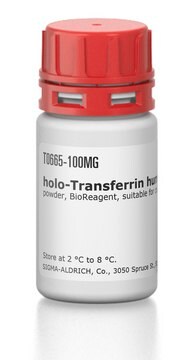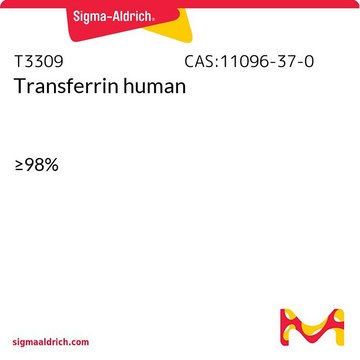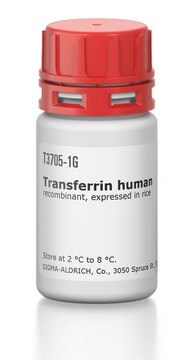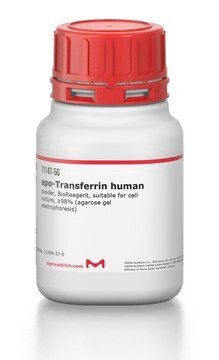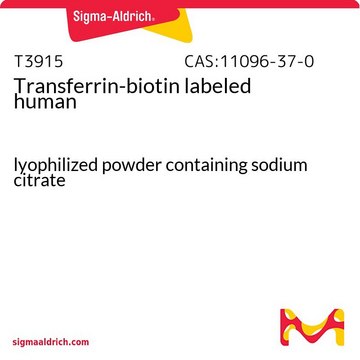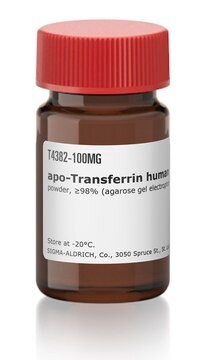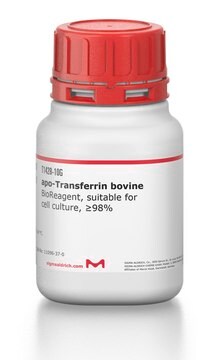10652202001
Roche
Transferrin
from human serum
Sinônimo(s):
serum glycoprotein, transferrin
Faça loginpara ver os preços organizacionais e de contrato
About This Item
Código UNSPSC:
12352207
Produtos recomendados
Nível de qualidade
esterilidade
0.2 μm filtered
Formulário
solution
embalagem
pkg of 20 mL (30 mg/ml)
fabricante/nome comercial
Roche
técnica(s)
cell culture | mammalian: suitable
cor
clear red
solubilidade
water: miscible
nº de adesão UniProt
temperatura de armazenamento
2-8°C
Informações sobre genes
human ... TF(7018)
Descrição geral
Transferrin is a serum glycoprotein that participates in the transport of iron from absorption and storage sites to tissue cells. The iron-bound transferrin, also referred to as ferrotransferrin, binds to specific cell surface receptors on growing cells and are internalized by endocytosis. Once inside, the iron is released into the cells and the iron-free transferrin, also referred to as apotransferrin, is exocytosed outside the cell without being degraded.
Aplicação
Transferrin, similar to insulin, is a component of most serum-free media formulations. The main function of transferrin is to transport iron into cells by receptor-mediated endocytosis.
Transferrin from human serum has been used as a supplement in:
Transferrin from human serum has been used as a supplement in:
- differentiation medium
- keratinocyte medium
- haemogenic endothelium culture medium
- embryoid-body medium
- blast colony forming cell-culture medium
forma física
Solution, 30 mg/ml in IMDM, filtered through 0.2 μm pore size membrane. Iron saturation is below 1%. This product is Apo-Transferrin.
Nota de preparo
Working concentration: 1 to 100 μg/ml
Armazenamento e estabilidade
Store at 2 to 8 °C. (lyophilizate and solution)
Outras notas
For life science research only. Not for use in diagnostic procedures.
Classe de risco de água (WGK)
WGK 1
Ponto de fulgor (°F)
No data available
Ponto de fulgor (°C)
No data available
Escolha uma das versões mais recentes:
Já possui este produto?
Encontre a documentação dos produtos que você adquiriu recentemente na biblioteca de documentos.
Os clientes também visualizaram
Zhiru Guo et al.
Journal of visualized experiments : JoVE, (49)(49), doi:10-doi:10 (2011-04-15)
The homeostasis of all self-renewing tissues is dependent on adult stem cells. As undifferentiated stem cells undergo asymmetric divisions, they generate daughter cells that retain the stem cell phenotype and transit-amplifying cells (TA cells) that migrate from the stem cell
Quantification of Mouse Hematopoietic Progenitors? Formation Using Time-lapse Microscopy and Image Analysis
Bergiers I, et al.
Bio-protocol, 9(1), e3137-e3137 (2019)
Iron deficiency affects early stages of embryonic hematopoiesis but not the
endothelial to hematopoietic transition.
endothelial to hematopoietic transition.
Shvartsman M, et al.
bioRxiv (2018)
Özge Vargel et al.
Scientific reports, 6, 21518-21518 (2016-02-20)
The endothelial to haematopoietic transition (EHT) is a key developmental process where a drastic change of endothelial cell morphology leads to the formation of blood stem and progenitor cells during embryogenesis. As TGFβ signalling triggers a similar event during embryonic
T J M Welting et al.
European cells & materials, 22, 420-436 (2011-12-21)
Skeletogenesis and bone fracture healing involve endochondral ossification, a process during which cartilaginous primordia are gradually replaced by bone tissue. In line with a role for cyclooxygenase-2 (COX-2) in the endochondral ossification process, non-steroidal anti-inflammatory drugs (NSAIDs) were reported to
Nossa equipe de cientistas tem experiência em todas as áreas de pesquisa, incluindo Life Sciences, ciência de materiais, síntese química, cromatografia, química analítica e muitas outras.
Entre em contato com a assistência técnica
